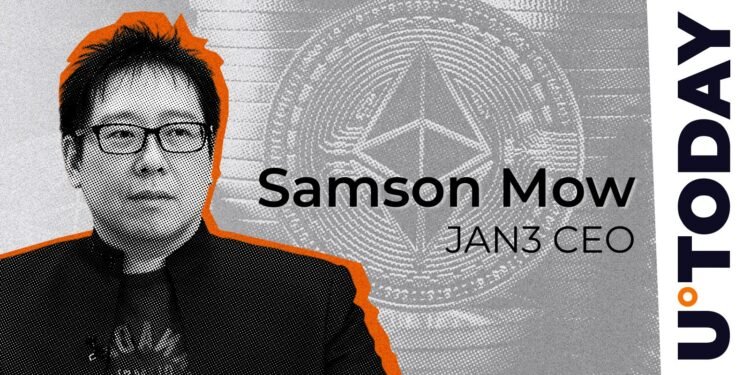Bitcoin Advocate Pushes for Ethereum Rollback Post Bybit’s Major Hack
Following a significant cyber breach resulting in the theft of $1.4 billion worth of Ethereum from Bybit exchange, Samson Mow, CEO of JAN3 and well-known Bitcoin advocate, has suggested a bold move: rolling back the Ethereum blockchain. This proposal has sparked discussions within the crypto sphere, particularly among Bitcoin maximalists, who have directed their attention toward Ethereum’s co-founder, Vitalik Buterin.
Mow, recognized for his critiques of Ethereum’s centralized structure, took to social media to voice his endorsement for resetting the Ethereum chain to recover the stolen assets. He raised concerns about the hacked Ethereum possibly funding North Korea’s nuclear ambitions, stressing the importance of rolling back Ethereum to uphold the ecosystem’s integrity. “Allowing $ETHNK to circulate means injecting $1.4 billion into North Korea’s nuclear armament. Ethereum must be rolled back. Restore $ETH now!” Mow tweeted, proposing a hypothetical renaming of the forked Ethereum to $ETHNK.
Expert Views and Market Context
The idea of blockchain rollbacks is laden with intricacies and controversies. Drawing on past events like the 2016 Ethereum DAO hack that spawned Ethereum Classic (ETC) post-rollback, experts are cautious about drastic measures. “A rollback poses critical queries about Ethereum network’s decentralization and security. Though it may offer a quick fix, it could erode trust in the broader blockchain ecosystem,” remarked a blockchain analyst.
The present crisis unfolds against a backdrop of heightened susceptibility in the crypto market, where hacking incidents are on the rise. Major exchanges like Binance, MEXC, and Bitget have united to extend liquidity support to Bybit, injecting roughly 50,000 ETH and other assets to stabilize the scenario.
Impact Assessment
Mow’s proposition for an Ethereum rollback could have profound repercussions. If implemented, it would necessitate widespread consensus among Ethereum stakeholders and potentially alienate factions valuing decentralization within the community. Moreover, it raises ethical dilemmas about tampering with the blockchain to address security-related issues.
Moreover, rebranding the chain could complicate the market landscape, leading to confusion among traders and investors. The introduction of a renamed chain alongside the existing Ethereum might devalue the latter, particularly if the proposal is viewed as a reactionary move rather than a well-thought-out strategy.
Conclusion
Amid the fallout of the Bybit breach, Mow’s plea for an Ethereum rollback sheds light on the mounting tensions and hurdles confronting the cryptocurrency sector. As prominent figures in the Bitcoin realm endorse Mow’s proposition, the implications of such a decision could reshape perceptions of Ethereum and the broader crypto market. These discussions underscore the critical importance of robust security measures and the preservation of decentralized governance tenets in blockchain tech. As the crypto landscape evolves, the outcome of this debate is poised to influence the trajectory of Ethereum and its community moving forward.








